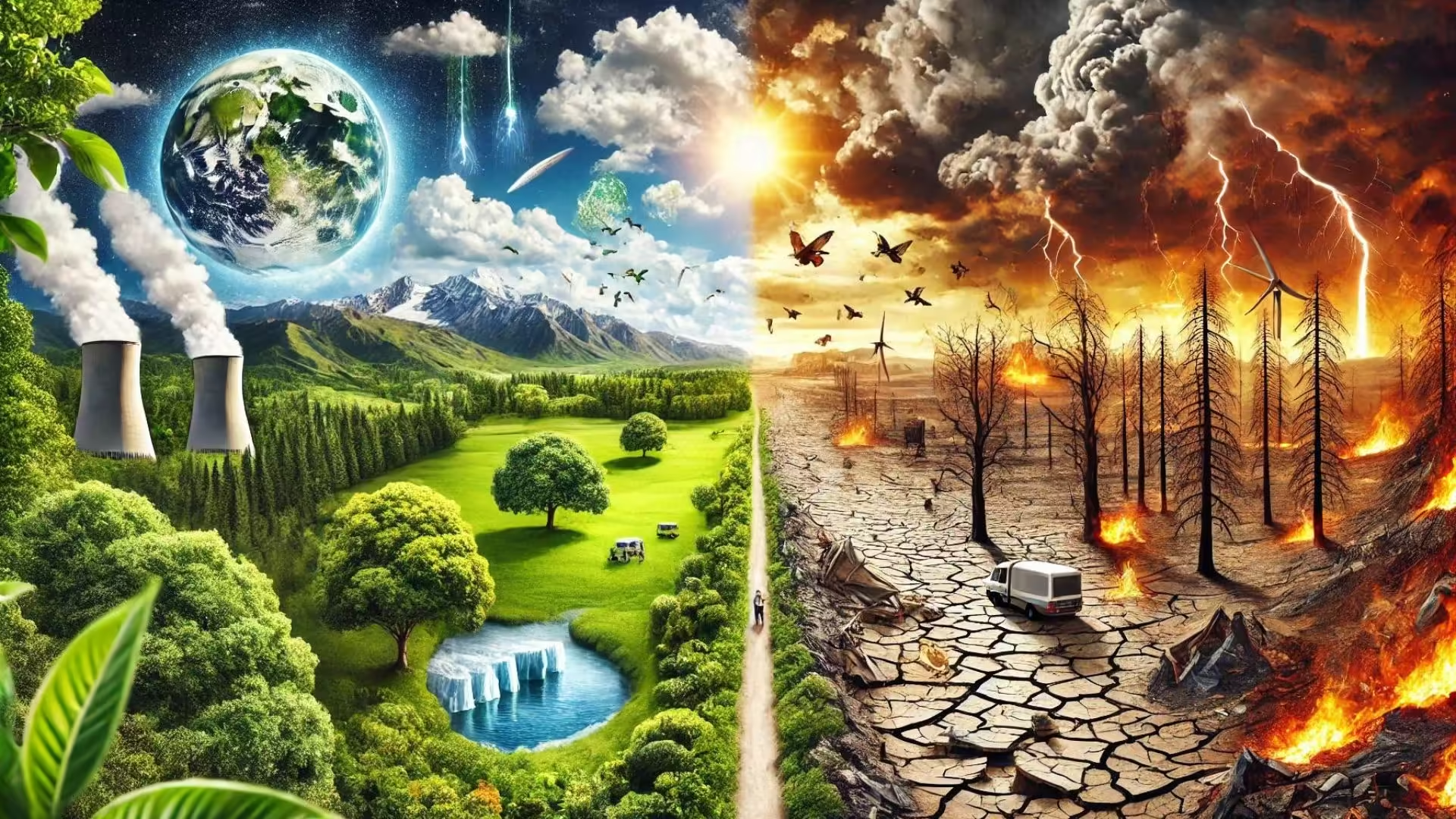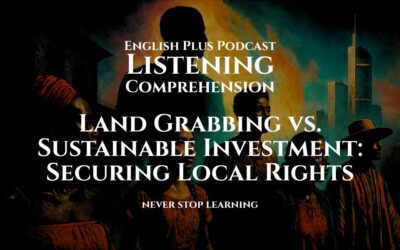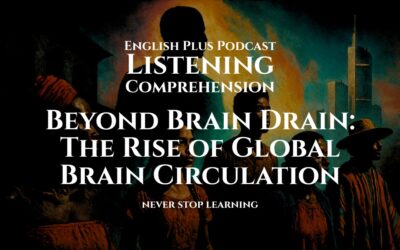Listen | Understanding Climate Change
Listening Comprehension Quiz
Transcript. Don’t use the transcript before you listen and attempt the quiz at least once.
Understanding Climate Change
Hello, everyone! Today, we’re diving into a topic that’s not just important but absolutely essential to understanding the world we live in: climate change. Now, don’t let the term intimidate you. It’s something we’ve all heard about, but today, I want to break it down for you in a way that makes sense and maybe even sparks your curiosity.
Let’s start by talking about what climate change actually means. At its core, climate change refers to significant changes in the Earth’s climate system over extended periods. You might be thinking, “Isn’t that just the weather?” Well, not quite. Weather is what happens day to day—like when you check the forecast to see if you need an umbrella. Climate, on the other hand, is more like the average weather over many years. It’s the long-term patterns and trends in temperature, precipitation, and wind.
So, why is climate change happening? The main culprit is something called the greenhouse effect. Sounds cozy, right? But here’s the thing—it’s both natural and, when intensified by human activities, a bit problematic. Naturally, the greenhouse effect keeps our planet warm enough to sustain life. Gases like carbon dioxide, methane, and water vapor trap heat from the sun, preventing it from escaping back into space. But human activities, especially since the Industrial Revolution, have pumped an excessive amount of these gases into the atmosphere, making the Earth warmer than it should be.
Let’s pause for a moment. Imagine you’re wearing a blanket on a chilly night. It’s comfortable at first, but if you keep adding blankets, it gets unbearably hot. That’s similar to what’s happening with our planet. We’re adding too many “blankets” of greenhouse gases, leading to global warming.
Now, you might wonder, “What are the effects of climate change?” Well, they’re both diverse and far-reaching. Rising global temperatures are causing polar ice to melt, which in turn raises sea levels. This might not sound like a big deal until you consider the millions of people living in coastal areas who could be displaced. Then there’s the impact on weather patterns, leading to more intense and frequent storms, droughts, and heatwaves. These changes affect agriculture, biodiversity, and even our health.
And here’s something interesting: climate change doesn’t just affect polar bears and far-off countries. It’s a global phenomenon that impacts everyone, everywhere. In fact, some of you might have noticed changes in your local environment—perhaps hotter summers or unusual weather patterns. These are all symptoms of a changing climate.
But let’s not get too gloomy. While climate change is a serious issue, there are ways to combat it. You and I, as individuals, can make a difference. Simple actions like reducing energy consumption, using public transportation, recycling, and supporting sustainable practices all contribute to the solution. Remember, the journey of a thousand miles begins with a single step.
Moreover, on a larger scale, governments and organizations are working to address climate change. The Paris Agreement, for example, is a global effort to limit temperature increases and reduce greenhouse gas emissions. Such initiatives highlight the importance of international cooperation in tackling this issue.
So, why should you care about climate change? Besides the obvious impact on our planet, addressing climate change is about preserving the quality of life for future generations. It’s about ensuring that our children and grandchildren inherit a world that is as beautiful and bountiful as the one we know today.
In conclusion, climate change is one of the defining challenges of our time. Understanding it is the first step toward making informed decisions and taking meaningful actions. Remember, each one of us has a role to play, and together, we can make a difference.
Thank you for joining me today. I hope this lecture has given you a clearer understanding of climate change and inspired you to think about your own impact on the environment. Keep exploring, stay curious, and never underestimate the power of your actions.
Expand Your Vocabulary
Understanding the vocabulary used in discussions about climate change can help you better comprehend the topic and express your thoughts more clearly. Here are ten important words and expressions mentioned in the article, along with explanations and examples of how they can be used in everyday English.
- Climate System
Meaning: The climate system refers to the complex interactions between the Earth’s atmosphere, hydrosphere (water bodies), cryosphere (ice and snow), lithosphere (land), and biosphere (living organisms) that influence the planet’s climate.
Example in everyday use: “The climate system is incredibly complex, with many factors affecting weather patterns globally.” - Greenhouse Effect
Meaning: The greenhouse effect is the process by which certain gases in the Earth’s atmosphere trap heat, preventing it from escaping into space, thus warming the planet.
Example in everyday use: “Thanks to the greenhouse effect, Earth is warm enough to support life, but human activities are making it stronger.” - Carbon Dioxide
Meaning: Carbon dioxide (CO2) is a colorless gas produced by burning carbon and organic compounds and by respiration. It is naturally present in the Earth’s atmosphere and is a major greenhouse gas.
Example in everyday use: “Cutting down on fossil fuels can help reduce carbon dioxide emissions and combat climate change.” - Global Warming
Meaning: Global warming refers to the long-term increase in Earth’s average surface temperature due to human activities, especially the emission of greenhouse gases.
Example in everyday use: “Global warming is leading to melting glaciers and rising sea levels.” - Sea Levels
Meaning: Sea levels refer to the average height of the ocean’s surface, used as a standard in measuring land elevation and depth. Rising sea levels are a consequence of melting ice caps and thermal expansion due to global warming.
Example in everyday use: “Coastal cities are at risk due to rising sea levels.” - Biodiversity
Meaning: Biodiversity refers to the variety of life in a particular habitat or ecosystem. Climate change can threaten biodiversity by altering habitats and ecosystems.
Example in everyday use: “Protecting biodiversity is essential for maintaining healthy ecosystems.” - Sustainable Practices
Meaning: Sustainable practices are methods of using resources that do not deplete or permanently damage them, ensuring long-term environmental health.
Example in everyday use: “Switching to renewable energy sources is a sustainable practice that can help fight climate change.” - Paris Agreement
Meaning: The Paris Agreement is an international treaty signed by numerous countries aimed at limiting global warming to below 2 degrees Celsius above pre-industrial levels by reducing greenhouse gas emissions.
Example in everyday use: “The Paris Agreement represents a global effort to tackle climate change.” - Displaced
Meaning: In the context of climate change, displaced refers to people or communities forced to leave their homes due to environmental changes such as rising sea levels or severe weather.
Example in everyday use: “Many island nations are worried about being displaced due to rising sea levels.” - International Cooperation
Meaning: International cooperation refers to countries working together to address global issues like climate change, recognizing that such challenges transcend national borders.
Example in everyday use: “International cooperation is vital in addressing the complex issue of climate change.”
Let’s Talk
Here are some thought-provoking questions based on the article that can help deepen your understanding and spark discussions with others:
- How has your understanding of climate change evolved after reading this article? Are there aspects of climate change you are more curious about now?
- Can you think of any specific examples from your own life where you have noticed the effects of climate change? How did it impact your perspective on the issue?
- What small actions can you take in your daily life to reduce your carbon footprint and help combat climate change?
- How do you think international cooperation can be improved to more effectively address climate change? Are there any countries you think are setting a good example?
- In what ways can individuals and communities be more proactive in protecting biodiversity and promoting sustainable practices?
Feel free to share your thoughts and responses to these questions in the comments section, or discuss them with friends and family to explore different perspectives and insights on this important topic.










0 Comments